Goering: Hossbach Conference
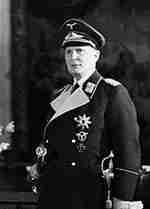
Dr. Stahmer: On 15 November 1937 a discussion [Hossbach Conference] with the Fuehrer took place at the Reich Chancellery, a record of which was prepared by a certain Colonel [Friedrich] Hossbach, and that has been referred to as Hitler's last will. [Note: Present at this conference were; German War Minister, Werner von Blomberg, Commander in Chief of the Army, Werner von Fritsch, Commander in Chief of the Navy, Erich Raeder, Commander in Chief of the Luftwaffe, Hermann Goering, Foreign Minister, Constantin von Neurath.] It has repeatedly been the subject of the proceedings here. May I ask you for a short explanation as to what significance this conference had. I am going to have that document shown to you. It is Document Number 386-PS.
Goering: This document has already been shown to me here, and I am fairly familiar with the contents. This document played an important role in the Indictment, since it appears under the heading "Testament of the Fuehrer." This word "testament" is, in fact, used in one place by Hossbach.
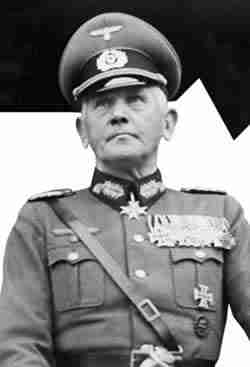
It contains a number of points, as I said at the time, which correspond exactly to what the Fuehrer had repeatedly said; but there are other points and expressions which I may say do not seem like the Fuehrer's words. During the last months I have seen too many records and interrogations which in part had nothing to do with it nor with the interpretation which had been given to it; for that reason I must here too point out the sources of mistakes. As far as the word "testament" is concerned, the use of this word contradicts the Fuehrer's views completely. If anybody at all knows anything about these views, it is I.
The decision that I was to be the successor was not made first on 1 September 1939, but as early as the late autumn of 1934. I have often had the opportunity of discussing the question of a so-called political testament with the Fuehrer. He turned it down, giving as his reason the fact that one could never appoint a successor by means of a political testament, for developments and political events must allow him complete freedom of action at all times. Quite possibly one could set down political wishes or views, but never binding statements in the shape of a will. That was his view then and as long as I stood in his confidence.
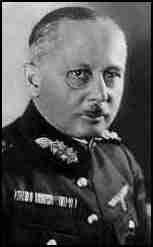
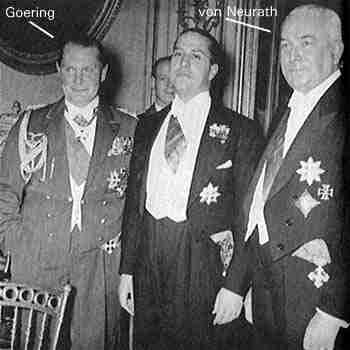
I should like to say that, if the Fuehrer, a couple of hours later, had talked to another group, for instance, diplomats of the Foreign Office, or Party functionaries, then he probably would have represented matters quite differently. Nevertheless, some of these statements naturally do reflect the basic attitude of the Fuehrer, but with the best intentions I cannot attach the same measure of significance to the document as is being attached to it here.
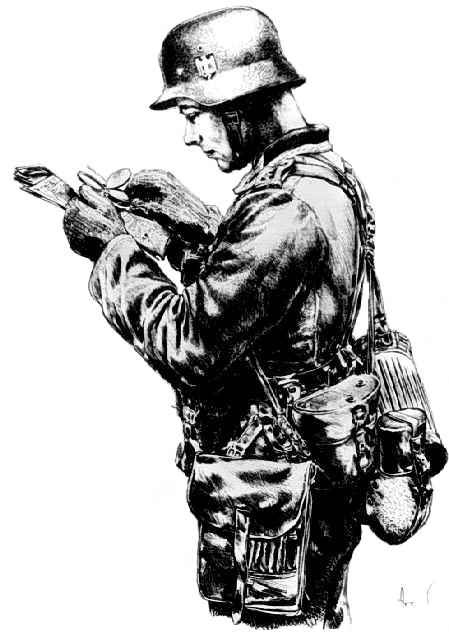





The Nuremberg Tribunal Biographies
Caution: As always, these excerpts from trial testimony should not necessarily be mistaken for fact. It should be kept in mind that they are the sometimes-desperate statements of hard-pressed defendants seeking to avoid culpability and shift responsibility from charges that, should they be found guilty, can possibly be punishable by death.
Disclaimer:The Propagander!™ includes diverse and controversial materials--such as excerpts from the writings of racists and anti-Semites--so that its readers can learn the nature and extent of hate and anti-Semitic discourse. It is our sincere belief that only the informed citizen can prevail over the ignorance of Racialist "thought." Far from approving these writings, The Propagander!™ condemns racism in all of its forms and manifestations.
Source Note: The trial portion of this material, which is available in its entirety at the outstanding Avalon and Nizkor sites, is being presented here in a catagorized form for ease of study and is not meant to supplant or replace these highly recommended sources.
Fair Use Notice: This site--The Propagander!™--may contain copyrighted material the use of which has not always been specifically authorized by the copyright owner. We are making such material available in our efforts to advance understanding of historical, political, human rights, economic, democracy, scientific, environmental, and social justice issues, etc. We believe this constitutes a "fair use" of any such copyrighted material as provided for in section 107 of the US Copyright Law. In accordance with Title 17 U.S.C. Section 107, the material on this site is distributed without profit to those who have expressed a prior interest in receiving the included information for research and educational purposes. If you wish to use copyrighted material from this site for purposes of your own that go beyond 'fair use', you must obtain permission from the copyright owner.

